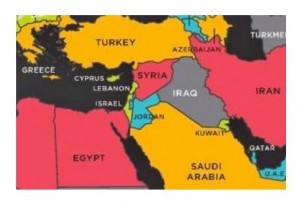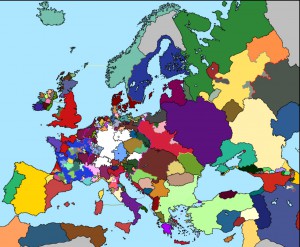Nation-states can be more trouble than they’re worth. For the Middle East, federalism, soft-partition, enclaves, and charter cities offer non-state paths to peace and prosperity.
The March Public Forum topic: “Resolved: The United States should no longer pressure Israel to work toward a two-state solution.”
Consider the most economically-free place in the world, Hong Kong, is not a state and was long a colonial charter city before handed over (or back) to communist China in 1997.
The Fraser Institute’s Economic Freedom of the World: 2016 Annual Report: 2016 (September 16, 2016), is relevant for both the China policy topic and the Israel/Palestine two-state topic. The reports top-rated countries:
Hong Kong and Singapore, once again, occupy the top two positions. The other nations in the top 10 are New Zealand, Switzerland, Canada, Georgia, Ireland, Mauritius, the United Arab Emirates, and Australia and the United Kingdom, tied for 10th.
Small and independent formerly British colonial territories Hong Kong, Singapore, and United Arab Emirates (“Abu Dhabi, Ajman, Fujairah, Sharjah, Dubai, Ras al-Khaimah and Umm al-Qaiwain”), plus New Zealand, Canada, Australia make up the top ten. Also in the top ten is Switzerland, an association of mostly-independent and diverse cantons. (However, not all former British colonies are wealthy or economically free, and the success of many today should not be taken as a defense of British colonialism.)
What lessons for Israel, Palestine, and the U.S. can be found in these diverse economic success stories of charter cities, federal republics, and common law traditions?
The people of Hong Kong were poor in the 1950s, as were people living in Palestine. Through the 1950s, millions of impoverished refugees arrived in Hong Kong, escaping from communist China.
Across the Middle East as in Asia, World War II disrupted and impoverished millions. Hundreds of thousands fled or were expelled from Palestine in the 1948 Arab-Israeli war. Then hundreds of thousands in long-established Jewish communities in Arab countries fled or were expelled.
Over the decades since 1950, Hong Kong residents have prospered, as have residents of Israel, but the economy of the Palestinian territories and its residents have not prospered.
Hong Kong’s charter with England protected international trade and investment, and taxes stayed low. Economic freedom and a great port enabled Hong Kong to grow rapidly prosperous. Could similar charter cities and economic freedom policies have enabled Palestinians and others in the Middle East to similarly prosper?
Turmoil and violence in Syria today turns on the Alawite minority’s long political and military control. Syrian could have been a much more prosperous place had the Alawites been able to keep their enclave independent from Syria. “Syria’s Ruling Alawite Sect” (New York Times, June 14, 2011). The article was written before the Syrian conflict erupted from Arab Spring protests, and as part of explaining Alawite history mentions:
During the French Mandate, there was even a short-lived Alawite “state” based in and around Latakia, created in 1922. As William L. Cleveland explained in his “History of the Modern Middle East,” the Alawite state was “administratively separate from Syria until 1942.”
 Enclaves, charter cities, and other administrated territories have a long history across Europe as well. Just check out a map of Europe in 15th Century.
Enclaves, charter cities, and other administrated territories have a long history across Europe as well. Just check out a map of Europe in 15th Century.
Political decentralization invites conflicts, but also open political competition where families and businesses can relocate to better governed territories. For an introduction to political decentralization, the Hanseatic League, and the potential of charter cities, see “The Politically Incorrect Guide to Ending Poverty,” (The Atlantic, July/August, 2010):
[Economist and entrepreneur] Paul Romer [is] trying to help the poorest countries grow rich—by convincing them to establish foreign-run “charter cities” within their borders. Romer’s idea is unconventional, even neo-colonial—the best analogy is Britain’s historic lease of Hong Kong. And against all odds, he just might make it happen.
Could the West Bank be a candidate for a charter city, perhaps administrated by an Arab country like Dubai or UAE?
In the Arab world, similar Hong Kong size countries have flourished without full statehood. Consider the colonial history of UAE, discussed in “The United Arab Emirates – A Product of British Imperialism?” (British Scholar Society, January 16, 2012)
Until 1971, the seven shaikhdoms that were to form the UAE had been known as Trucial States and been part of Great Britain’s informal empire in the Persian Gulf. British power in the area had been based on an interdependent system of military presence, formal treaty relations with the Trucial States, Bahrain and Qatar, as well as informal political influence on the local rulers.
——-
According to the Economic Freedom of the Arab World: 2016 Annual Report (Fraser Institute, December 3, 2016), Bahrain, Jordan and the United Arab Emirates (UAE) are the most economically free nations in the Arab world. From the Introduction:
Economic Freedom of the Arab World aims to provide a reliable and objective metric of economic policy throughout the Arab World. It measures the extent to which citizens of the nations of the Arab League are able to make their own economic decisions without limitations imposed by the government or by crony elites. The report provides sound empirical measurement of economic policy that can distinguish between phony reform that leaves economic and political power in the hands of crony elites, and real reform that creates new prosperity, entrepreneurship, and jobs, by opening business and work opportunities for everyone no matter whom they know.
Arab and Islamic societies have a rich trading tradition, one that celebrates markets open even to the humblest members of society. Economic freedom is consistent with that proud history and provides a path to a more prosperous and freer tomorrow. Economic freedom is simply the ability of individuals and families to take charge of their fate and make their own economic decisions—to sell or buy in the marketplace without discrimination, to open or close a business, to work for whom they wish or hire whom they wish, to receive investment or invest in others. As discussed later in this report, economic freedom has a proven fact-based record of improving the lives of people, liberating them from dependence, and leading to other freedoms and democracy. Unfortunately, many in the Arab world believe their nations have already gone through a period of free-market reform and that it hasn’t worked. This misconception deprives many of an economic alternative and vision for the future.
For Public Forum debaters considering past U.S. government pressure for a “two-state solution,” a focus on economic freedom provides an reform opportunity. It is true that Israel’s military control restricts freedom of movement and trade throughout the Palestinian territories, and Israeli officials and supporters insist this is to reduce possible terrorist attacks. But there are also major restrictions on doing business enforced by regulations and corruption of Palestinian officials.
Again, criticizing Palestinian officials is not to defend Israeli restrictions on economic freedom. But consider “Terrorists & Kleptocrats: How Corruption is Eating the Palestinians Alive,” (The Tower, June, 2014). (The Tower is Israel-based.)
By myopically focusing on “yes,” the U.S. is ensuring the Palestinian Authority will remain corrupt and therefore illegitimate in the eyes of the Palestinian people. My experience confirms Schanzer’s argument. The PA is an incredibly corrupt organization. So is its dominant party, Fatah. Together they form a motley crew of elites seeking to maintain power and the attenuating trappings, willing to do whatever it takes to ensure their power and position are not lost.
The 2016 Economic Freedom of the Arab World report rates the Palestinian Territories. Here is summary (page 23):
The Palestinian Territories overall score remained 7.3 and it stayed in 8th place. The Palestinian Territories maintained the same rank (5th) and score (7.7) in the size of government area. The territories’ score in rule of law declined to 5.7 from 6.2, coming in 13th, down from 10th last year. The Palestinian Territories had a score of 9.1 in sound money, up from 9.0, and ranked 11th, up from 12th. In the area of freedom to trade internationally, the Palestinian Territories scored 7.7, down from 7.8, with a rank of 8th, down from 6th. The rank in regulation remained the same as last year at 12th, with a score of 6.1, same as last year.
Comparing economic freedom in the PA to the freer and more prosperous UAE, Jordan, and Bahrain, the top three Arab countries, gives direction to reform proposals that the U.S. could encourage.
The report focuses on economic freedom’s role in increasing prosperity, creating jobs, and reducing poverty. …
“Hong Kong and Palestine; what makes a country?” (REB Research Blog), offers some history of colonial Hong Kong and Palestine and a discussion of international agreements on what makes a county.
